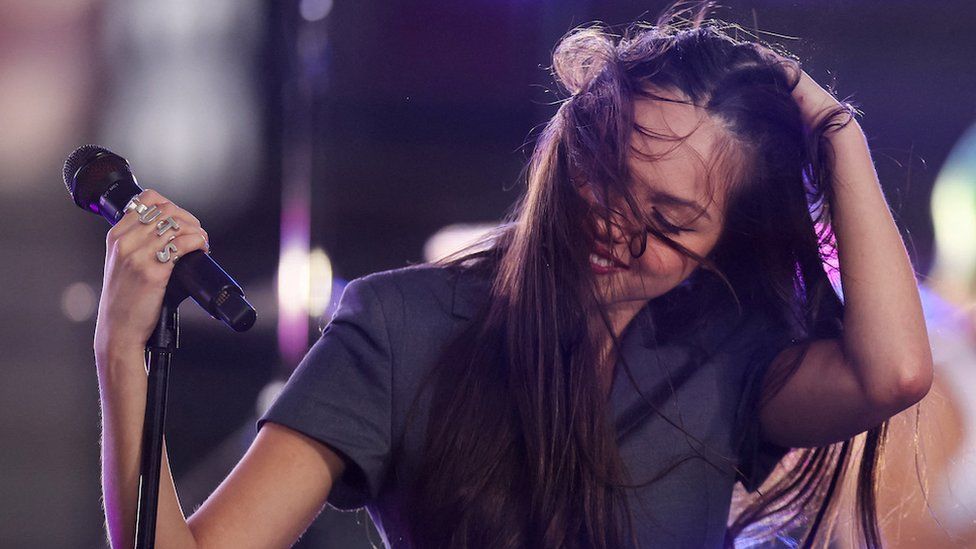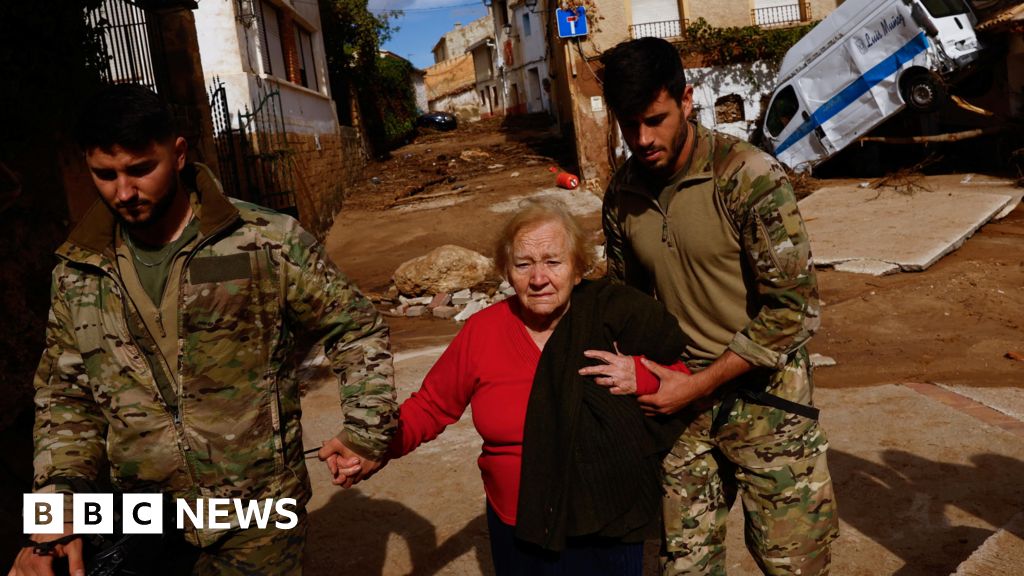ARTICLE AD BOX
 Image source, Reuters
Image source, Reuters
Olivia Rodrigo went from Disney actress to global pop star almost overnight
By Mark Savage
BBC Music Correspondent
Olivia Rodrigo is a unicorn.
With one song, she achieved the sort of overnight success that isn't supposed to be possible in the modern, fractured music industry.
Drivers License, released in January 2021, broke Spotify records in just 24 hours. Then it broke them again. Seven days later, it entered the UK and the US charts at number one.
Even her record label was taken by surprise.
"I think we'd all be lying if we said we knew the extent of what was coming," Polydor's president Ben Mortimer admitted.
Drivers License wasn't a one-off. Rodrigo's debut album, Sour, sparked a pop-punk renaissance, spawned four more chart hits, and earned three Grammy Awards.
The star was invited to the White House as part of a vaccination drive, and used her Glastonbury debut to protest the overturning of Roe v Wade, which removed the federal right to abortion in the US.
Amidst it all, she returned to film her final episodes of the Disney series High School Musical: The Musical: The Series; and staged her first tour, cautiously playing smaller venues because, prior to the 2021 Brit Awards, she'd never played any of her own material in front of an audience.
"Looking back, I'm like, God, what a crazy trajectory," says the singer, now 20 years old, when we meet in London in August.
"It was, obviously, just absurd and crazy. I'd been writing songs and working my whole life, but it did seem sort of instantaneous.
"And it wasn't until very recently that I began to process how irrevocably my life was changed in a span of a few months."
Olivia Rodrigo on her unlikely army of dad fans
A self-described introvert, she stepped out of the limelight as soon as the Sour tour wrapped up in July last year.
"I spent a lot of time alone," she says, describing long days filled with classic movies, knitting and baking oatmeal cookies.
"My God, that makes me sound so lame," she laughs. "Look at the old woman over here!"
But it wasn't long before she was drawn back to her first love - music.
Rodrigo has been obsessed with writing and performing for as long as she can remember. As a toddler, she would make up songs about getting lost in the grocery store, or decorating Christmas trees. She even released one of them as a festive gift for fans in 2022.
Her first "proper song" (her words) was a piano ballad called Naive Girl, which she posted to Instagram at the age of 12. It's a little rough, but it already bears the hallmarks of her sound: Angst-ridden lyrics, octave-spanning vocals, and a flair for the dramatic.
"I've changed myself to help you / But how does that help me?"
Around the same time, she was cast in the Disney series Bizaardvark, playing the role of aspiring musician Paige Olvera, for which she had to learn guitar. That led to her casting in High School Musical, where she penned a handful of original songs, setting the groundwork for her solo career.
Image source, Disney
Image caption,Rodrigo starred in Bizaardvark with Madison Hu, who remains one of her best friends and accompanied the star on her recent trip to London
But nothing could have prepared her - or anyone - for the sudden, overwhelming success of Sour. When Rodrigo started writing the follow-up, it's not a surprise to learn she got into her own head.
"Towards the beginning of writing the album, I struggled," she confesses.
"I'd sit down and write lyrics and the only thing I'd think about is people on Twitter dissecting them.
"That's the antithesis of creativity. So I had to shift my mind-set about halfway through making the record, into just trying to make songs that I would like to hear on the radio.
"The second that I did that, it started becoming so much more fun, and it felt creative again."
It helps that Rodrigo knows her stuff. She name-checks artists like Joni Mitchell, Paul Simon, Jack White, Alanis Morissette, Lily Allen, Billy Joel, Tori Amos - all musical storytellers, whose lyrics are as memorable as their melodies.
During a pause in our interview, she talks animatedly about the stolen demo tapes for Wings' Band On The Run album and Prince's mythical 1980s break-up song Wally, which was so raw he had it destroyed.
"What I wouldn't do to hear that," she sighs.
On Sour, however, her musical inspirations were maybe too apparent. Both Paramore and Taylor Swift were retrospectively added to the credits over similarities to previous tunes.
It's telling that, when asked to pick a favourite from the follow-up, Rodrigo chooses the opening track, All-American Bitch [link contains expletives] because "it didn't feel like it was trying to emulate anything else".
That's an understatement. The song begins with finger-picked guitar and a delicate, whispered vocal before exploding into a punky diatribe about the unattainable expectations imposed on women: To be smart but unthreatening, sexy but virginal, and never, ever unable to control your feelings.
"I'm grateful all the time / I'm sexy and I'm kind / I'm pretty when I cry," she sings, with sarcastic venom.
"Women are so discouraged from showing emotions, like anger or dissatisfaction for fear of being [seen as] ungrateful or hard to be around, and I've always struggled with that," she explains
"And because I've always felt that pressure to be this perfect All-American Girl, I kind of repressed a lot of feelings in my life. And I think that came up and hurt me in different ways."
Music has been her sanctuary - a place where "you can just be as messy and angry and enraged as you want".
In person, Rodrigo is none of those things.
Image source, Getty Images
Image caption,Rodrigo prepares for a performance on NBC's Today Show, 8 September 2023
Like a lot of US stars, she's surrounded by a huge team that fuss over her hair and make-up but Rodrigo is serene and charming. She makes a point of greeting every member of the BBC camera crew individually and offers to pose for photographs, knowing people will be too timid to ask.
In our interview she answers questions in full paragraphs, wrapping up each thought with a neat concluding line. There's a self-assuredness that, presumably, comes from being a professional actress on adult-run sets for half of her life.
The veneer crumbles on the album track Ballad Of A Homeschooled Girl. There, Rodrigo documents the social awkwardness she feels amongst her peers, as she desperately searches "how to start a conversation" on her phone.
"I went to school on set, on my little laptop, from the age of 12," she says.
"At the time, I didn't realise how strange it was but, looking back, it's a unique way to grow up."
As she gets older, she realises she missed out on a typical American teenager's rites of passage. When a fan recently ambushed her with an invitation to prom, she was thrilled, exclaiming: "Oh my God! I've always wanted to go to prom. Give me your number!
"I got to do all these amazing things and I'm so grateful for my career," she reflects, "but you miss out on certain things in pursuit of that, and that's just how life goes".
One hundred new songs
Rodrigo had the title for her second album, Guts, before Sour came out. She likes that it has multiple meanings: "Following your gut means trusting your intuition, having guts can mean bravery, and spilling your guts is telling everyone all your secrets - which is what songwriting is."
Unlike most modern pop artists, Rodrigo avoids writing by committee, working almost exclusively with her creative partner Daniel Nigro.
For Guts, they wrote more than 100 songs - a figure that "sounds way more impressive than it actually is", she says.
"I'm a very quantity-driven songwriter. Waking up every day and stretching that muscle is just so important, even if you don't really write anything you'll ever use."
Image source, Disney
Image caption,The star avoids expensive recording studios, recording both her albums in the home studio of her creative partner Daniel Nigro.
The songs that survived lean heavily towards rock, a reaction to the gigs she played in support of Sour.
"I love doing a song that drives and gets heavy," she says. "It's such a cathartic experience to sing that stuff in a crowd of people."
Released on Friday, the album is outselling the rest of the UK Top 10 combined, and reviews have been overwhelmingly positive. Rolling Stone called it "another instant classic" while no less than The New York Times praised Rodrigo as "a songwriter of rather astonishing purity".
Lyrically, her songs work like miniature movie scripts, with scenes that build to a climax and, more often than not, a macabre twist.
Take Vampire [link contains expletives], Guts' lead single and her third UK number one. Aimed at an older boyfriend who took advantage of her celebrity, she lays the groundwork from the opening bars, which echo the chord progression of Radiohead's Creep to plant the idea of that parasitic antagonist.
Through the first verse, she makes literary allusions to his shadowy nature: He lives in a castle, he only comes out at night. Then, as the chorus rises, she suddenly cuts the backing track for the big reveal: "Bloodsucker, fame ****** bleeding me dry like a goddamn vampire" (Rodrigo is a master of the strategically-deployed f-bomb).
As the musicology podcast Switched On Pop recently observed, Vampire gathers pace in the second verse, with galloping drums that suggest a chase scene - but it all ends on an unresolved chord. Our heroine has failed to escape his clutches.
That theme - of going back to an ex she describes as a "weird, second-string loser who's not worth mentioning" - reappears throughout the album.
"Yes, I know that he's my ex / But can't two people reconnect?" she asks on the second single, Bad Idea, Right? Meanwhile, on the tongue-in-cheek Get Him Back, Rodrigo is having a hard time choosing between her desires for romance and revenge: "I wanna break his heart, just to stitch it up."
Image source, Label supplied
Image caption,The star says Guts is "about growing up and figuring out who I want to be as a person".
Online sleuths have tried to uncover the target of her lyrics but Rodrigo knows better than to fuel the fire, simply telling one interviewer: "I've dated people that I shouldn't have".
Ultimately, she says, revealing too much personal detail weakens the songs.
"I think that's why music is so magical. You can write about an experience that you feel is really unique to you - and then you put it out and people from all different walks of life are like, 'I can really relate to this.'
"For me, that's been really encouraging. It just made me feel less lonely in the world."
Was she surprised at how strongly her music connected?
"I don't know if this is weird to say, but I was surprised how many older men really liked the music," she replies.
"I was a 17-year-old girl writing all these songs [about heartbreak] and I had so many dads come up to me and be like, 'Wow, I really love that'.
"It just shows: We're all so much more alike than we are different. At the core of every human is the same feeling of love and anger and heartbreak."
But while Guts churns with rage and despair and youthful misadventure, the singer insists she was in a much happier place than last time around.
"I wasn't as heartbroken, I was more hopeful. I was still pretty angsty, I guess, but I just felt a little more playful."
Fans who used her first album as a route through their break-ups needn't worry though.
"I've got a few more heartbreaks left in me," Rodrigo laughs. "I feel like we'll see a few more heartbreak albums."
Some of the song lyrics in the links contain expletives.

 1 year ago
20
1 year ago
20








 English (US)
English (US)